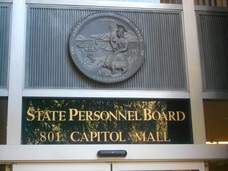Legal Representation of State Employees in SPB Disciplinary Proceedings
State Personnel Board provides for a speedier, less costly and far more simple ways and procedures of resolving state employer-employee disputes than other avenues, including pursuing legal action in court. Another significant advantage, that unlike in court, at SPB hearings the employer has the burden of proof - in other words the employer has to prove (by proponderance of evidence) that the violations that they accuse the employee of took place. On the other hand, in court the employer doesn't have to prove anything and it's the employee's burden to prove that he or she has been discriminated, harassed, retaliated, etc.
Having said that, it might be critically important to have legal representation at hearing or at a pre-hearing settlement conference to make sure that you put your best foot forward, that you understand what your rights are and how to present your case and how to defend against the employer's allegations the best possible way. The steaks at SPB hearings can range from as low LOI (letter of instruction) or LOR (letter of reprimand) to significant pay cuts for a shorter or longer period of times, administrative suspension without pay and even termination. Even a relatively low level of discipline can affect the state employee's future career by preventing them from applying from promotion and salary in crease as soon as they otherwise could.
An experienced employment attorney should explain the process to you, understand the facts of your case (both disputed and undisputed by the parties), guide you through the process and ensure that either you get the best deal at the settlement conference stage, or that you get the best representation at the SPB hearing.
State Personnel Board has significant authority and discretion when rendering decisions on the adverse actions taken by the state agency against its employees. For example, it can sustain employment termination of a state employee or reverse it, order the agency to take the employee back to work and even order back pay of lost wages during the time that the subject employee was not working.
If you are an employee of the State of California and you have been served with notice of adverse action that you would like to contest, contact us to discuss how we can help you.
Having said that, it might be critically important to have legal representation at hearing or at a pre-hearing settlement conference to make sure that you put your best foot forward, that you understand what your rights are and how to present your case and how to defend against the employer's allegations the best possible way. The steaks at SPB hearings can range from as low LOI (letter of instruction) or LOR (letter of reprimand) to significant pay cuts for a shorter or longer period of times, administrative suspension without pay and even termination. Even a relatively low level of discipline can affect the state employee's future career by preventing them from applying from promotion and salary in crease as soon as they otherwise could.
An experienced employment attorney should explain the process to you, understand the facts of your case (both disputed and undisputed by the parties), guide you through the process and ensure that either you get the best deal at the settlement conference stage, or that you get the best representation at the SPB hearing.
State Personnel Board has significant authority and discretion when rendering decisions on the adverse actions taken by the state agency against its employees. For example, it can sustain employment termination of a state employee or reverse it, order the agency to take the employee back to work and even order back pay of lost wages during the time that the subject employee was not working.
If you are an employee of the State of California and you have been served with notice of adverse action that you would like to contest, contact us to discuss how we can help you.
